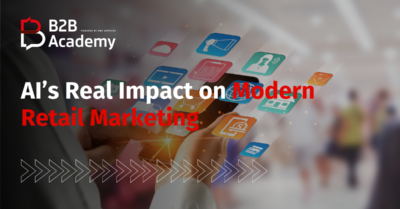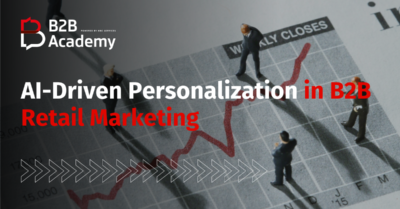AI is everywhere in sales and marketing. It’s writing your email subject lines, qualifying leads, and deciding which ad gets in front of which buyer. It’s smart, fast, and (when used right) a game-changer for B2B teams.
However, your customers—whether CMOs, procurement leads, or sales directors—aren’t just evaluating your product or service. They’re also assessing how much they can trust the AI-driven decisions behind it. And if they don’t trust the technology, they won’t trust the results. This article focuses on building trust in AI-powered sales and marketing—so you can use automation without losing credibility with your buyers.
Why Some Buyers Are Skeptical About AI
AI might help you work smarter, but for buyers, it often raises more questions than answers.
- Are AI-driven recommendations biased? No one wants AI pushing the wrong leads or favoring certain industries unfairly.
- Is customer data being used responsibly? With privacy concerns at an all-time high, transparency matters more than ever.
- Can they trust AI-generated insights for big decisions? If AI suggests a marketing strategy or sales move, buyers need to know it’s based on solid reasoning—not just an opaque algorithm.
If your prospects are asking these questions, it’s a sign they’re engaged. Your job? Show them that AI in sales and marketing isn’t just about automation—it’s about delivering results they can trust.
1. Transparency: No One Wants a Mystery Box
You know how frustrating it is if you’ve ever received a sales pitch where the value was buried under a pile of buzzwords. AI can feel the same way to your buyers; useful but confusing.
So, how do you build trust when AI is powering everything from lead scoring to customer engagement?
- Tell buyers when AI is in play: If your platform uses AI for predictive analytics or personalization, say so—clearly. Instead of “Our system optimizes your funnel in real-time,” try “Our AI analyzes your lead data and prioritizes high-intent prospects.” Clarity wins deals.
- Explain how AI makes decisions: A lead scoring tool that assigns random numbers is useless. However, one that says, “We ranked this lead high because they engaged with three case studies and a demo request,” builds confidence.
- Give customers control: If your marketing automation or CRM suggests an action, let users adjust it. AI should be an advisor, not a dictator.
Because let’s be honest—if buyers don’t trust how your AI-driven solutions work, they won’t use them. And an unused feature? That’s churn waiting to happen.
2. Data Privacy: “Trust Us” Isn’t a Strategy
AI runs on data, and in B2B sales and marketing, data is gold. But if your customers think AI is using their data in ways they wouldn’t approve of, that trust disappears fast.
How do you keep AI-driven marketing and sales strategies ethical?
- Make data usage clear: If you’re collecting behavioral data from website visits or CRM interactions, tell users how it’s used. “We analyze your engagement to personalize content” is far better than vague privacy policies nobody reads.
- Use AI for insights, not overreach: Nobody wants a sales rep reaching out with “I saw you viewed our pricing page at 10:47 AM”. Instead, AI should be helping sales teams time their outreach without being intrusive.
- Secure sensitive data: If AI is handling deal information, customer interactions, or business insights, treat it like the sensitive asset it is. Buyers will ask about compliance—be ready with clear answers.
Your customers want to use AI-powered tools to grow their business. But if they think your AI is using their data irresponsibly? That deal is dead in the water.
3. AI and Ethics
AI is great at helping sales teams prioritize leads, personalize outreach, and predict customer needs. But used carelessly, it can also create problems:
- AI-driven pricing that feels unfair: If your pricing model adjusts based on customer behavior, make sure it doesn’t penalize certain industries or company sizes.
- Lead scoring that reinforces bias: If AI always prioritizes a certain type of customer (say, tech startups over manufacturing firms), you could be missing valuable opportunities.
- Over-personalization gets creepy: There’s a fine line between “helpful” and “how did they know that?” Make sure AI is personalizing in a way that enhances trust, not breaks it.
A good rule of thumb? If a buyer asks, “How did your AI know this?” and you don’t have a straightforward answer, rethink your approach.
4. How Does AI and Compliance Work in Sales & Marketing?
Now, let’s address a question we got from one of our registered participants: How do AI and compliance play nicely together?
Great question—compliance isn’t optional in B2B sales and marketing. Whether it’s GDPR, CCPA, or industry-specific regulations, AI needs to follow the same rules as human-driven processes.
Here’s how AI can actually help with compliance rather than complicating it:
- Automate compliance checks: AI can flag non-compliant language in marketing materials, sales outreach, or data collection practices.
- Ensure auditability: AI-driven decisions should be trackable, whether lead scoring, content recommendations, or campaign automation. Buyers (and regulators) want to know why certain actions were taken.
- Stay aligned with privacy laws: AI should respect opt-ins, user preferences, and data retention policies. Automated personalization means nothing if it violates data protection laws.
Want a deeper discussion? We’re hosting a webinar on AI and automation for social media strategies—and compliance will be part of the conversation. Join us here!
5. Keeping the Human Touch in AI-Driven Sales & Marketing
Here’s the irony: AI is supposed to make sales and marketing more personal, yet if overused, it can feel completely impersonal.
So, how do you use AI to support sales and marketing without losing the human connection that actually wins deals?
- AI should assist, not replace: If AI helps sales reps qualify leads, great. But when it’s time for a demo or negotiation, honest conversations matter. Make sure AI enhances, not eliminates, human interaction.
- Keep brand personality alive: AI-generated emails and ads don’t have to sound robotic. Train AI to use your brand’s tone so automation still feels human.
- Showcase your people: AI might help manage customer interactions, but buyers still want to see the team behind the product. Use real people in your marketing and sales efforts.
AI can make B2B sales and marketing more intelligent, efficient, and effective. But technology alone doesn’t build trust. People do. Because if your AI-driven strategy feels confusing, intrusive, or impersonal, prospects won’t just walk away. They’ll run.
But if you’re using AI to improve transparency, protect data, and support real human relationships, you’re not just selling. You’re building trust. And in B2B, trust is what makes the deal happen.





